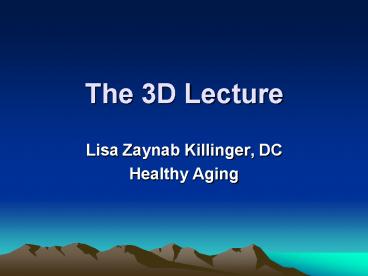The 3D Lecture - PowerPoint PPT Presentation
1 / 22
Title:
The 3D Lecture
Description:
Organic brain disorders. Immunological disease-RA, Lupus, etc. ... Also: Mental exercises, crosswords, math, brain teasers, puzzles. Alz: Common Drug Therapies ... – PowerPoint PPT presentation
Number of Views:94
Avg rating:3.0/5.0
Title: The 3D Lecture
1
The 3D Lecture
- Lisa Zaynab Killinger, DC
- Healthy Aging
2
What are the 3Ds?
3
Ds There are 3
- Depression-A mental state characterized by
dejection, lack of hope, and absence of
cheerfulness. - Delirium-A state of mental confusion, with
disorientation to time and place. - Dementia-Irrecoverable deteriorative mental
state, the common end of many health conditions
or scenarios.
4
Depression
- Acute or chronic
- Often precipitate by life events, chronic pain,
or chemical imbalance (drugs/alcohol) - 80 of depressions are totally reversed with
treatment - Important to detect/screen for to prevent suicide
(the worst outcome of depression) - Often confused with dementia cant focus
5
Causes of Depression
- Drugs/alcohol
- Dietary inadequacy
- Neoplasias
- Social change or psychological stress
- Organic brain disorders
- Immunological disease-RA, Lupus, etc.
6
Assessment/Management
- Mini-mental status exam
- Geriatric Depression Scale-score 8 ?
- Ask about life events, trauma, drugs/alcohol
- Drink more than 6 alcoholic bev/day? !
- Management Adjust, identify support network,
refer for counselling/support, drug therapies
(prevent suicide !) - Address patient pain-esp. chronic pain
7
Dementia
- Chronic confusion
- Loss of memory, language, judgement, etc
- Alzheimers is most common type
- Slow, gradual onset (years to decades)
- Changes in behavior and personality
- No known cure
8
Dementia Etiologies
- Alcoholic or toxic
- Degenerative-neurofibrilar tangles
- Epileptic or apoplectic-w/ hemorrhage/tumors
(vascular) - Paralytica-pt becomes paralyzed
- Syphilis, AIDs or Post-febrile (Infectious)
- Trauma
9
Alzheimers Patient Presentation
- Memory impairment (progressive worsening)
- Language prob Aphasia, Apraxia, etc.
- Impairment of social or occupation fx.
- Age 40-90
- No disturbance of consiousness
- Also may wander, inapprop. verbalizing/actions,
sadness/crying, anorexia, non-responsive
(Maletta 1995)
10
Assessment/Management
- Mini-Mental Status Exam
- Rule out delirium, depression, B12 def.
- Review history-ask new questions
- Neuroimaging CT or MRI
- (AAN, American Academy of Neurology, Practice
Parameters Neurology, 2001)
11
Management Alzheimers
- Adjust then refer for further eval.
- Reminiscence.remember when
- Prevention Regular interaction with people
- Also Mental exercises, crosswords, math, brain
teasers, puzzles
12
Alz Common Drug Therapies
- Risperodone (newer)
- Olanzapine (newer)
- Chlorpromazine
- Thioridazine
- Haloperidol
- Loxapine
- Quetiapine, Clozapine, Ziprasidone
- (Schneider 1990)
13
Snoezelen
- Multisensory environmental therapy
- Stimulates the senses of touch, hearing, taste,
smell, and sight - Soft music, favorite foods, photos, aromatherapy,
textured objects, etc. - Used widely in UK/Europe now in US (J Geront
Nursing March 2002)
14
Delirium
- Acute confusion
- Sudden, rapid onset
- Cause Drug reaction, infection, trauma
- Difficulties w/attention, thinking, memory
- Disturbances in sleep, psychomotor activity
- Often confused with Alzheimers
- Completely reversible if treated
15
Delirium-Types
- Alcoholic or drug induced
- Febrile
- Traumatic
- Delirium Tremens-hallucinations, suicidal
tendencies,(pt needs constant supervision)
Restraints?
16
Assessment/Management
- Mini-mental status exam
- Physical exam-check for fever/infection
- Medication evaluation (drugs are confusing)
- Ask about alcohol-More than 6 drinks/day?
- Manage adjust, care for infection, refer for
reconsideration of drugs, alcohol rehab.
17
Ramifications of Misclassification
18
Florence, 75, a long standing pt of yours comes
to you after a 6 month break from care, and has
trouble filling out the intake forms. She seems
to be less lucid than when you saw her last, and
doesnt seem to care about the missing answers on
the form.What do you do?
19
Harry, an 83 yr old patient, has always been
sharp as a tack. This time, his daughter, who
drives him to his appointment, tells you shes
very worried. She states that Harry has been very
confused for a couple of days. He just recently
saw his MD. What do you do?
20
You are worried about Charlie. He has been a
patient of yours for almost a decade. You have
observed a gradual decline in his memory. He
states that he got lost coming to your office,
even though his been there hundreds of times. He
has no living family membershes a loner.What
do you do?
21
TAKE HOME MESSAGES1. Some of your patients
will experience confusion2. Know the different
types, and differentials3. Have a plan of
action, some resources, and another health
professional to confer with4. Dont be
afraid/keep your pts safe!
22
Thank you for your attention!































